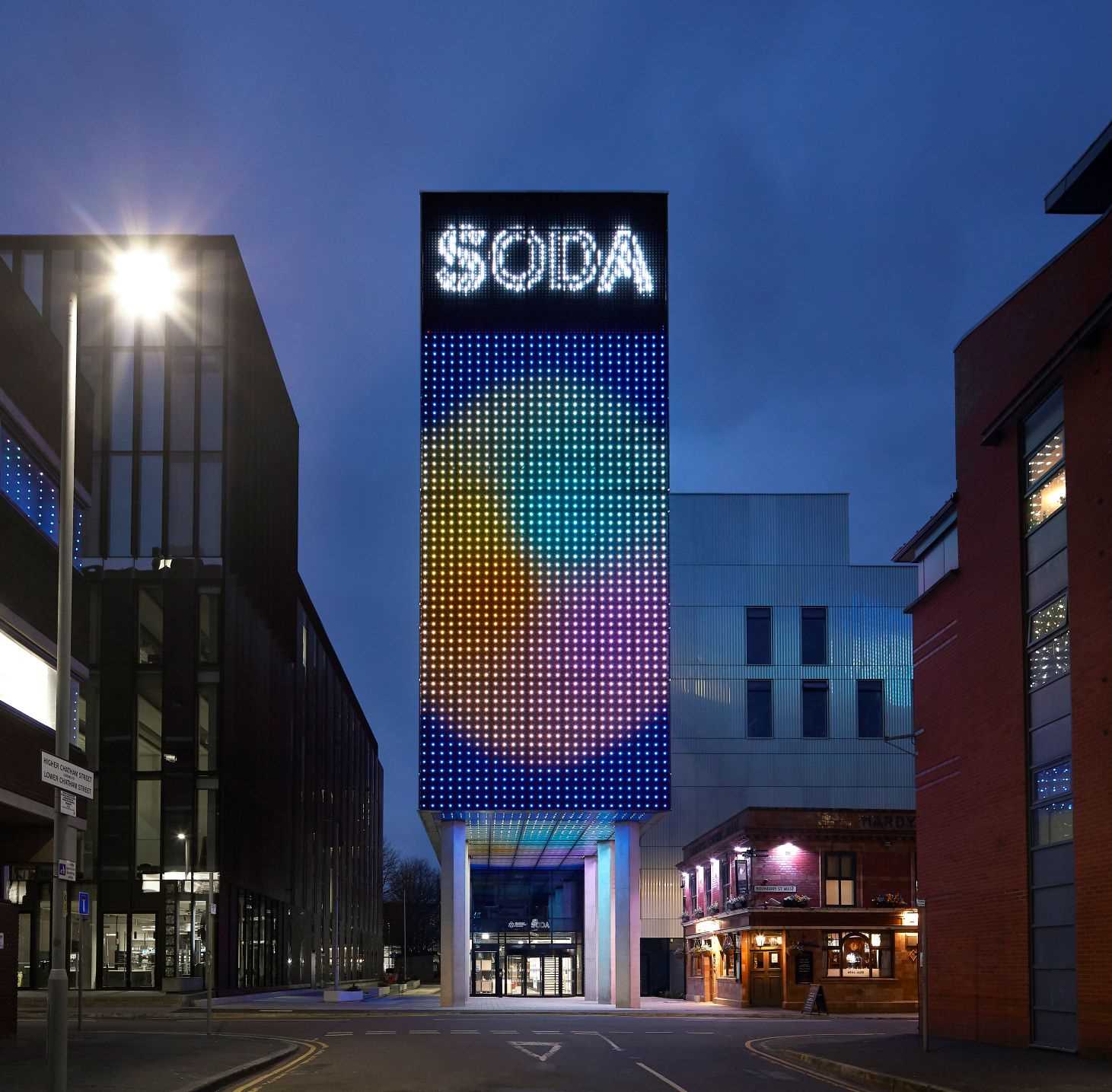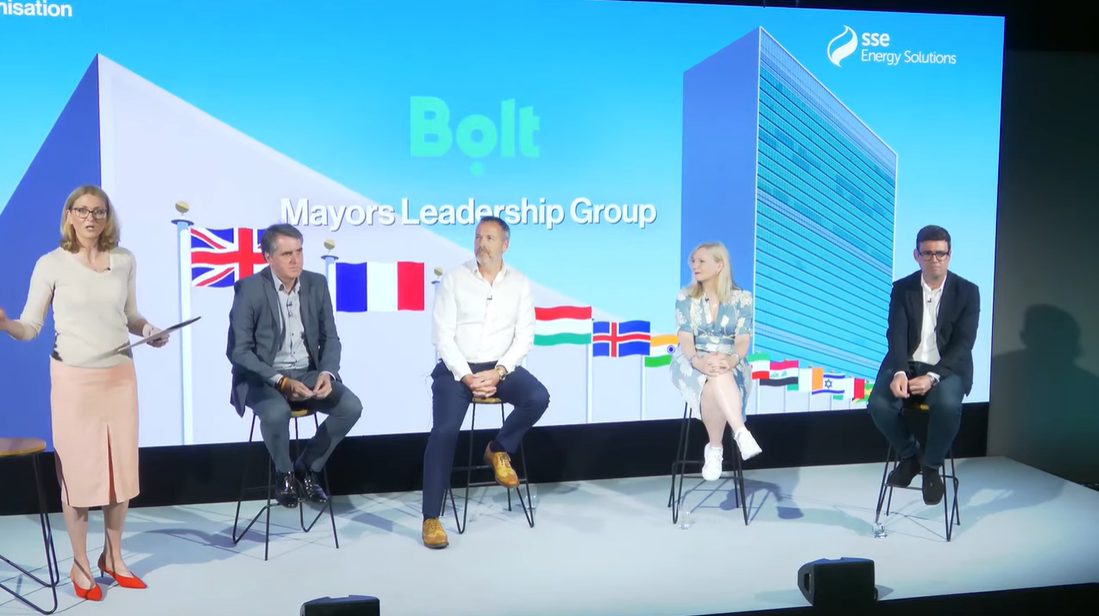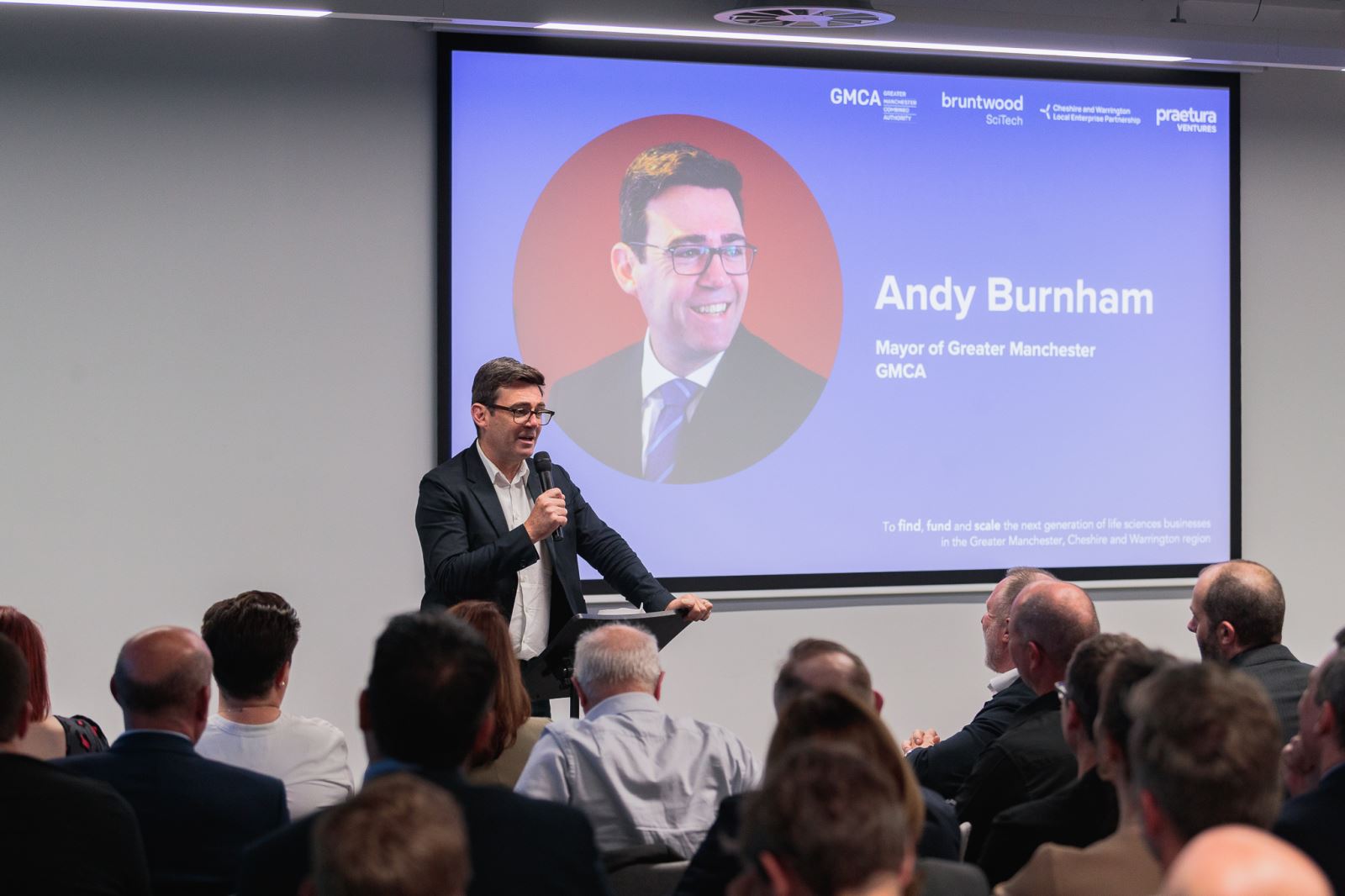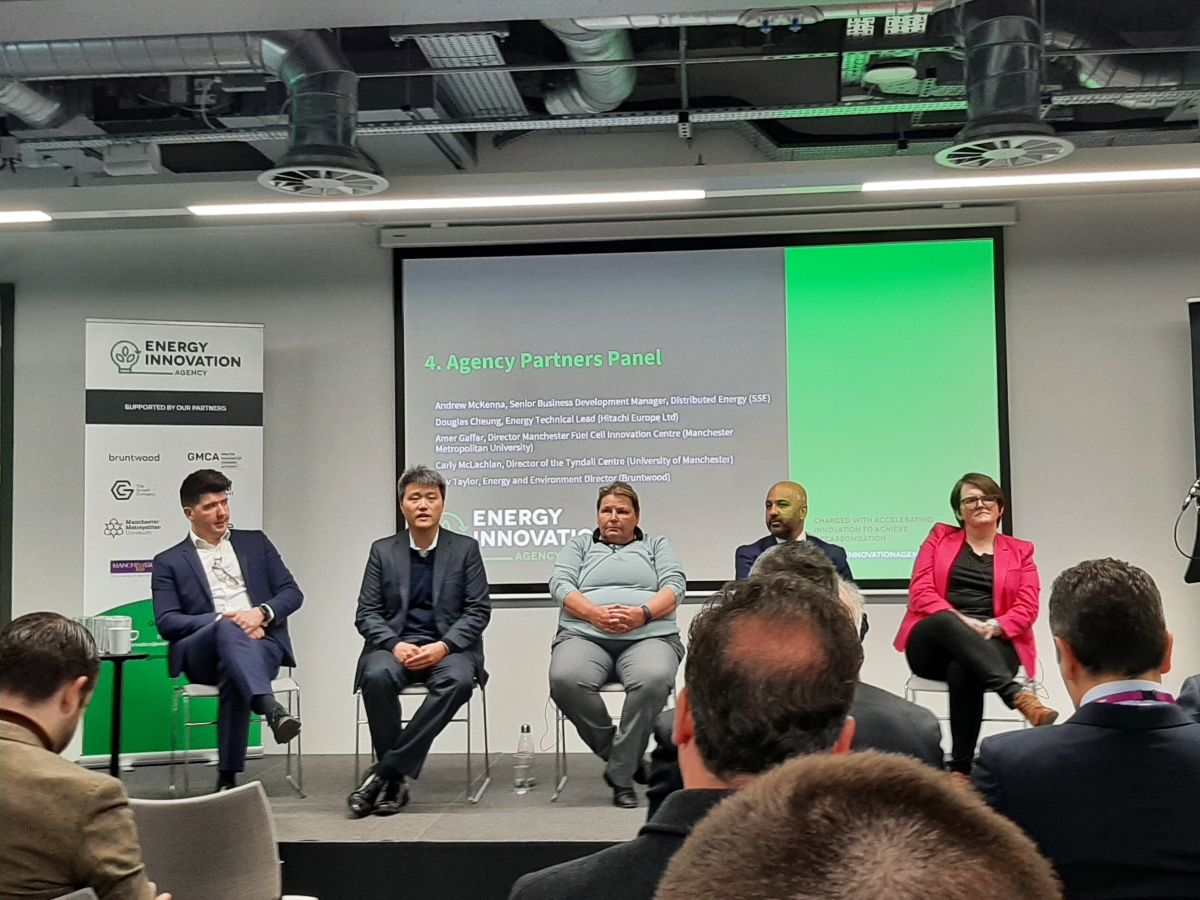Insights
Greater Manchester’s Digital Security Hub opens applications for start-up accelerator scheme
Early-stage cyber security and digital startups can now apply for the new digital security accelerator programme from Greater Manchester’s Digital Security Hub (DiSH).
DiSH is being delivered by Barclays Eagle Labs, Lancaster University, University of Manchester and Plexal with support from Manchester City Council. It was first launched in June 2022 with the aim of supporting 500 start-ups and creating over 1,000 jobs in Greater Manchester.
The next accelerator scheme will begin on 24 October and will be delivered by Plexal. The three-month DiSH Accelerator will give digital security and cyber businesses from Greater Manchester access to mentors, coaching, events, industry connections and support to help them grow their early-stage businesses.
Applicants will be able to work from the 11,000-square-foot DiSH workspace in Manchester and will benefit from investment readiness and funding support, business masterclasses, 1:1 mentoring, pitch coaching, industry introductions and events with networking opportunities
According to the government’s latest Sectoral Analysis of the UK’s cyber sector, more than 1,800 cyber security firms generated a total of £10.1bn in revenue in the most recent financial year. This is a 14% increase from the previous financial year.
Cyber also contributed around £5.3bn to the UK economy in 2021, rising by a third from the previous year from £4bn – the largest increase since the report began in 2018.
Greater Manchester is already home to several tech unicorns as well as GCHQ’s offices. The city-region has a burgeoning cyber security sector and is the fastest-growing tech city in Europe.
Greater Manchester’s homegrown digital security companies include Avecto, Hedgehog, NCC Group and Secarma, and it’s also attracted cyber divisions of companies such as Raytheon, BAE Systems AI and Northrop Grumman.
Saj Huq, CCO and head of innovation at Plexal, says: “We’re thrilled to be the innovation partner to the DiSH and are excited by the opportunity to design and deliver the first DiSH Accelerator targeted at supporting innovative, early-stage startups. Greater Manchester has a fast-growing cyber scene, and there are increasing opportunities for the regional startup ecosystem to engage and collaborate with an array of potential customers and partners as they scale their propositions and build market share.
“The DiSH Accelerator promises to act as a catalyst for that opportunity and we encourage ambitious startups to apply.”
David Bleakman, Barclays Eagle Labs Cyber Security Lead, says: “We know from experience that access to accelerator programmes with mentoring and support is hugely beneficial to the growth of an early-stage business. Connecting with like-minded entrepreneurs, universities and industry bodies, as well as potential clients and investors, helps to build networks and stimulate growth.
“This is why we want to encourage digital security and cyber startups across the region to join us on the DiSH accelerator, to help boost their growth and unlock their potential.”
Local Growth Fund: Manchester Metropolitan University’s School of Digital Arts (SODA)
Manchester Metropolitan’s School of Digital Arts (SODA) is a £35 million interdisciplinary establishment which builds on the strengths and reputation of the Manchester School of Art.
SODA officially opened in November 2021 and students are now benefitting from the school’s industry-standard facilities and world-leading research in digital and technological arts. The Greater Manchester Combined Authority (GMCA) and the Greater Manchester Local Enterprise Partnership (GMLEP) were proud to support Manchester Metropolitan’s vision for SODA, contributing £14.9 million of grant funding for the project through the Local Growth Fund Programme.
The building spans five storeys and features open workspaces to promote student innovation and collaboration. The building’s design also allows SODA to adapt and respond to emerging technologies for years to come. All aspects of the building are used creatively to showcase students’ digital content. One of the most impressive features is an integrated LED light wall which covers the building façade and provides an innovative digital canvas for student work.
In addition, the school offers the latest technological facilities to support high quality learning across all courses offered. These facilities include a UX suite, film studios, green screens, edit suites, sound & music production studios and a cinema.
The school was developed to invest in teaching and research that will drive Greater Manchester’s next generation of creative content. Students can study a range of specialist disciplines where creativity meets technology including film, animation, UX design, photography, sound design, gaming, and AI. These are offered across a flexible mix of courses from undergraduate, postgraduate and research degrees to degree apprenticeships.
The school collaborates with leading industry partners who help inform SODA’s curriculum to give students the required industry-ready skills and experiences to launch a career in the creative media, arts and digital tech industries. The university expects that around 450 graduates will leave SODA in summer 2024 with the highly sought-after skills that meet the demands of creative industries.
Manchester Metropolitan University’s SODA has arrived in Greater Manchester at the perfect time. It is based an area that is widely recognised as a national and international media hub, home to MediaCityUK, the BBC and ITV as well as a thriving creative and cultural scene.
SODA is ideally placed to provide students with the best post-study opportunities, and in doing so, retaining the city region’s creative talent to drive its digital economy forwards. The school will also help cement Greater Manchester as one of the most important digital and media hubs globally.



Net Zero future vision revealed as Manchester hosts Decarbonisation Summit 2022
GM LEP board member and Mayor of Greater Manchester were among representatives from the city-region at The Decarbonisation Summit 2022.
Held this year in Manchester’s Science and Industry Museum, the Decarbonisation Summit is an annual two-day event which brings together business leaders, politicians and climate activists. The event propels a vision for a decarbonised future, providing a space to share ideas, visions and challenges in the race to Net-Zero.
This year’s event held discussions covering a range of topics including food production, sustainable transport, heat innovation, retrofitting and the future of green skills. Panels also debated how to empower SMEs to become net-zero and what is needed to create sustainable city-regions going forward.
Major themes across the conference were the devolution of powers to city regions and collaboration between the public and private sector in the race to net-zero. There was an overwhelming sense that these crucial goals and targets will require a collective approach if we are to succeed and create a more sustainable future. The collaboration will allow us to think smarter and act more quickly when solving global challenges.
In a session called Green Investment in Sustainable Cities, Councillor Tracey Rawlins, Manchester City Council’s Executive Committee Member for Environment joined a panel examining how smart money can empower decarbonisation in cities. The panel considered housing, transport and how local authorities can excite and inform people within their region about the transition to net-zero.
Councillor Tracey Rawlins stated,
“We need to think about how we work together so we don’t do things city by city. We need to use our collective buying power, our collective experience, and our collective influence to make bigger and better changes. We need to be bold. Change is always difficult; it’s going to come and it’s going to hurt but we have to face that pain. This is a necessity.”
Mayor of Greater Manchester Andy Burnham joined the Mayors Leadership Group to talk about how city mayors can accelerate net-zero ambitions within their city regions. The other panellists included Tracy Brabin, Mayor of West Yorkshire and Steve Rotherham the Metro Mayor of Liverpool City Region. In the panel, the mayors discussed carbon neutral targets, investments in sustainable transport and green skills requirements but most crucially, how city-regions can work together and the powers needed to achieve their net-zero ambitions.
Mayor of Greater Manchester Andy Burnham said,
“Decarbonisation could mean a solution to the cost-of-living crisis. A net-zero country will be driven from the bottom up, not from the top down. You have to win hearts and minds to get people to change their homes or how they move, and city-regions are the ones that can do that.
“Transport is an example of how the North of England can lead the change the rest of the country wants to see. We have to integrate public transport across the north and decarbonise. Greater Manchester our trams already run-on renewable energy, but within a decade our whole system can run on green energy. It’s a realistic vision if we’re backed to do it.”
You can watch the streams of different panel discussions at the Decarbonisation Summit 2022 here.
To learn more about the Decarbonisation Summit, visit their website.

Decarbonisation Summit 2022
New £20M Life Sciences fund launches to support SMEs in Greater Manchester, Cheshire and Warrington
- ‘GMC Life Sciences Fund by Praetura’ aims to bolster Greater Manchester and Cheshire and Warrington’s flourishing life sciences sector.
- The fund, raised by partners including Bruntwood SciTech, Greater Manchester Combined Authority (GMCA) and Cheshire and Warrington Local Enterprise Partnership (LEP), will be deployed by Manchester-based Praetura Ventures.
- The fund will be launched with an initial £20m with the aim of supporting innovation and growing the region’s knowledge economy, creating more skilled jobs and helping businesses to expand internationally.
The ‘GMC Life Sciences Fund By Praetura’ – a partnership between Greater Manchester Combined Authority (GMCA), Cheshire and Warrington Local Enterprise Partnership (LEP), Bruntwood SciTech and Praetura Ventures – will combine capital, expertise and resources to help investee companies in Greater Manchester, Cheshire and Warrington to scale.
GMCA has committed £10m to the fund, whilst Cheshire and Warrington LEP and Bruntwood SciTech have both committed £5m to continue to build on the North West’s world-leading cluster of clinical, academic and commercial life sciences assets, companies and expertise.
The ‘GMC Life Sciences Fund By Praetura’ will offer investment of £50k-£2m to early-stage businesses and SMEs that are located in Greater Manchester, Cheshire or Warrington, or those that commit to relocating their operations there. The fund will be launched with an initial £20m with the aim of supporting innovation, creating more skilled jobs and helping businesses to expand internationally.
As the UK’s leading property provider dedicated to driving the growth of the science and technology sector Bruntwood SciTech, a partnership between property company Bruntwood and Legal & General, plays a critical role in facilitating growth of the life sciences sector. As well as offering world-class office and lab space and a range of scientific services, Bruntwood SciTech provide specialist business support to the science and tech businesses based at their 11 campuses across the UK offering unrivalled direct access to highly-skilled STEM talent, new markets, mentorship, and funding such as the GMC Life Sciences Fund.
As a northern-centric venture capital investor, Praetura Ventures will manage the fund. Alongside an injection of capital, Praetura Ventures will support the investee companies through dedicated resources, including Praetura’s celebrated operational partner programme – which supports promising founders with additional expertise and mentoring from industry experts – and bespoke portfolio toolkit.
The North West life science sector currently employs more than 28,000 people and is a key pillar of growth for the knowledge economy. It is recognised locally and nationally as a leading example of collaboration between research, academic spin outs and private commercialisation and is home to globally renowned universities and companies, and fast-growing entrepreneurial businesses.
Mayor of Greater Manchester Andy Burnham, speaking at the fund’s launch at Circle Square, said:
“ The region’s life sciences sector continues to turn heads on the global stage, living up to our heritage of consistently pioneering and generating world-firsts.
“ The pandemic thrust the life science sector’s contribution into the public eye and made us understand the impact it can have on our lives. This fund’s aim is to find, fund and scale the next generation of life science entrepreneurs. It will help grow the sector and create opportunities for key stakeholders across Greater Manchester, Cheshire and Warrington.
“ This is an example of how we are supporting firms to innovate and grow. Greater Manchester is a great place to set up a business in sectors like life sciences, owing to its huge diverse talent pool and relatively lower operating costs. Through Innovation Greater Manchester we will be continuing to create the right environment for enterprise and innovation to thrive. ”
Clare Hayward MBE, DL, Chair, Cheshire and Warrington LEP, said:
“ The GMC Life Sciences Fund will be warmly welcomed by the fast growing entrepreneurial businesses in the life sciences sector who are delivering ground-breaking science. This is a big step towards our vision to be a global leader in the full life sciences cycle. ”
David Foreman, managing director at Praetura Ventures, said:
“ We are committed to helping the founders of start-ups in the life sciences sector to build the best business they can. In partnership with the GMCA, Bruntwood SciTech and Cheshire and Warrington LEP, we are uniquely placed to help the innovators who are changing the sector for the better, not only with the funding they need to grow, but by providing their teams with dedicated support, networks and resources. ”
Chris Oglesby, Executive Chair of Bruntwood SciTech, said:
“ The North West has a truly vibrant life sciences sector, recognised globally for the talent and innovation it fosters. This powerful ecosystem can support the translation of ground-breaking science and research into successful, scalable businesses for the long term. It is as a direct result of long-term partnerships between public and private sector organisations that the sector continues to thrive, enabling opportunities for life science businesses to gain direct access to research, talent and the NHS to accelerate their growth, and we very much look forward to supporting the next generation of life science entrepreneurs with this fund. ”
The fund launched on the 24th May 2022 at a dedicated event in Bruntwood SciTech’s No.1 Circle Square in the heart of Manchester’s innovation district, which brought together stakeholders from across the sector. New investments will be announced later in the year.

The Decarbonisation Summit will come to Manchester this June to accelerate the race to Net-Zero
The Decarbonisation Summit will come to Greater Manchester in June, following the success of the event in Glasgow last year. The two-day conference aims to propel a vision for a decarbonised future across the globe, inspire change, initiate action, and amplify a range of vital voices in the race to zero emissions.
Taking place on 7th and 8th June, The Decarbonisation will be held in Manchester’s Science & Industry Museum. Manchester is a city renowned for innovation and industry, its history is rooted in the industrial revolution, with the Science and Industry Museum playing a vital role in its past present and future. Greater Manchester is now placing itself at the forefront of Green Innovation and this includes Decarbonisation.
Greater Manchester as a city region has an ambitious target to become carbon neutral by 2038 and is running many initiatives to ensure that it can meet this target including Bee Net Zero which supports businesses to reach carbon neutrality and a newly launched Energy Innovation Agency to revolutionise the region’s energy consumption.
The region has seen a 21% reduction in carbon emissions during 2020-21 compared to 2019-20. With world-class institutions and a determination to pioneer change, it makes sense that The Decarbonisation Summit has chosen Manchester as its host city this year.
The Decarbonisation Summit will bring together a network of like-minded, pioneers with a shared mission. This space for collaboration and innovation will be invaluable on the road to net-zero and help to strengthen Greater Manchester’s position as a leading innovator.
Throughout the event, speakers from a wide range of sectors will come together to share ideas, visions, and breakthroughs.
The likes of politicians and CEOs will be joined by graduate students and climate activists proving that everyone has a part to play in decarbonisation and the opportunity to make a real difference.
Decarbonisation must work across borders, sectors, and boundaries to be successful, therefore the event’s panels will cover every major aspect of modern industry and society, to give us the chance to unpack and dissect each sector and discuss the ground-breaking solutions which will make a decarbonised future possible.
Panel discussions at The Decarbonisation Summit will include:
- Empowering SMEs Towards Net-Zero
- Green Investment in Sustainable Cities
- The Power of Retrofitting
- Mayors Leadership Group
- Eating Emissions – How can the plant-based food and the agricultural sectors work together to decarbonise our diets?
- EV UK – Accelerating investment in UK emobility to ensure it is fair and accessible for all
- Maximising Renewable Technology at a Local Level
- District Heating – How do we widen the role of heat networks to power cities in the UK towards net-zero?
- Jobs, Skills and Opportunities in Sustainability
- Active Travel Britain
The Decarbonisation Summit will be held on Tuesday 7th and Wednesday 8th June at The Science and Industry Museum in Manchester and will also be streamed online.
To find out more about the event, and to register to attend, click here.

Energy Innovation Agency Launches in Greater Manchester to Accelerate Carbon Neutral Target
GM LEP Board Member Steve Connor chaired an event to launch a new Energy Innovation Agency that hopes to accelerate Greater Manchester’s carbon-neutral targets.
This unique collaboration between local government, the private sector and academic sectors, aims to help Greater Manchester remain at the forefront of green innovation.
The Energy Innovation Agency, which was launched at an event in Bruntwood’s Circle Square development on Thursday 28 April, has been established to bridge the innovation gap by bringing together critical players in the field and creating a pathway for new ideas.
The agency has been devised by 8 key partners: Greater Manchester Combined Authority (GMCA), The Growth Company, Hitachi Europe, Bruntwood, SSE Enterprise, The University of Manchester, Manchester Metropolitan University and the University of Salford. It’s hoped that the collaboration will transform energy consumption across Greater Manchester and beyond, making it more accessible and fairer for all.
The main objective of the Energy Innovation Agency is to attract innovators to Greater Manchester, helping them to scale up solutions, focus on rapid commercialisation, and encourage investment which will allow green initiatives to become a reality for more people.
To launch the event, Steve Connor GM LEP Board Member said in his opening address,
“Yet again, Greater Manchester is taking the lead and, today, we take the first step on a different kind of journey.”
To celebrate the official launch of the agency, innovators and energy professionals gathered to discuss the obstacles and challenges faced in reaching net-zero targets as well as potential solutions. These challenges include the innovation gap, issues in retrofitting, skills gaps, supply chains and timings, inclusivity, and the wider education of people around new technologies.
There was also an address from the Mayor of Greater Manchester and GM LEP Board Member, Andy Burnham and a panel discussion between key partners which discussed the necessity to look at the energy crisis holistically to promote the vital acceleration of change.
At the launch event, Peter Emery, CEO of Electricity North West and Chair of the Energy Innovation Agency said,
“If we keep going at the same rate as we are, Greater Manchester will blow its carbon budget in six years. The political will is there, but more action is needed. We need to turn frustrations into positive outcomes, giving a pathway to change and innovation. The Energy Innovation Agency adds a fresh dimension and Greater Manchester is the place to make this happen.”
One of the ways the Energy Innovation Agency hopes to attract innovators into Greater Manchester is through challenge events, where they will be invited to pitch ideas and solutions to specific challenges. The first challenge was initiated at the Energy Innovation Agency’s Launch and focuses on the issue of non-domestic Retrofit.
Around 80% of Greater Manchester’s current buildings will still be standing in 2050, so retrofitting needs to be a priority. However, with heritage status, currently occupied buildings and the new, more agile approach to working life provide significant challenges that the agency is asking innovators to help overcome.
Bev Taylor, Energy and Environment Director of Bruntwood said,
“All new builds have sustainability at the heart, but this is less easy when retrofitting. No one size fits all, and it takes time to get the right solution. People’s expectations of a modern workplace are changing, and along with the climate crisis, we can no longer do what we’ve always done. We need change now, and I’m hoping the Energy Innovation Agency can speed this up.”

Energy Innovation Agency launch, Bruntwood Circle Square
